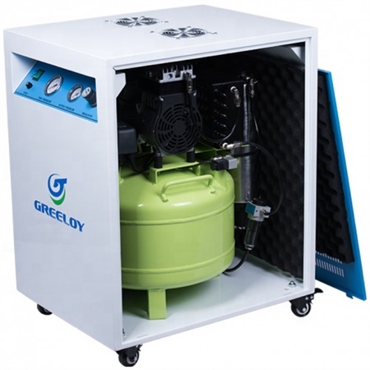Several questions when purchasing a dental compressor

Air compressors are a vital piece of any dental office, since they power many of the most important tools.
Air compressors are a vital piece of any dental office, since they power many of the most important tools. Selecting the right compressor can help you build a practice poised for growth, while choosing poorly could potentially expose your patients to harm. While using a specific type of air compressor does not guarantee pathogens are not present, it does help to select a compressor that will provide the best air quality possible.
The dental compressor: How does it work?
The dental compressor has the function of producing compressed air that is stored in a high pressure tank so that it can be used at any time. This air is then taken to the dental equipment through tubes designed for this purpose. Dental compressors consume electrical energy to produce this compressed air, and must have sufficient power to generate compressed air faster than we consume it in the dental clinic.
There are several questions we should ask ourselves before buying a dental compressor, to choose the most appropriate one.
Dry or oil-lubricated compressor?
To install it in a dental clinic you should undoubtedly choose a dry compressor, as the quality of the air produced will be much better.
Compressor with air dryer or without air dryer?
If the relative humidity of the air is high, for example, in coastal sites, we should choose a compressor with air dryer, because if we do not have it, the compressor will give us many problems of condensation of water inside.
If we are in a place with a very low relative air humidity, we can do without the air dryer and save some in the purchase of the compressor. However, the dryer is something that always benefits the compressor, and will make it need less maintenance.
Which compressor size should I choose?
The maximum pressure supplied by dental clinic compressors will always be similar regardless of the size of the compressor we choose, as the equipment always works at similar pressures. On the other hand, the air flow produced by the compressor will vary.
We will have to choose a compressor that has the capacity to produce at least the same flow of air as the dental equipment that is going to operate simultaneously.
Dental compressors can have one, two, three or more cylinders, depending on the flow of air to be produced. The size of the boiler is also important, since the more air the boiler can store, the less time the compressor motor will have to work.
Buy for the Future With Dental Compressor
Like other portable dental equipment you use, not all air compressors are created equal. There are a variety of capacity and power options, plus materials and layout that can make or break a system for your dental office. We’ve looked at some of the chief points for selecting the right air compressor and what requirements you should be aware of when you make your choice.

